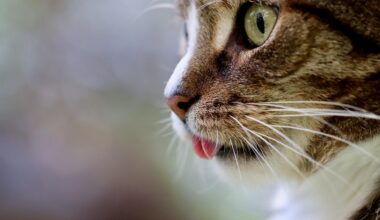Identifying Pneumonia in Cats: Symptoms and Treatments
Pneumonia in cats is a serious respiratory condition that requires immediate attention. This condition occurs when the lungs become inflamed, often due to infections caused by bacteria, viruses, or fungi. Identifying pneumonia early can significantly affect treatment success and improve the chances of recovery. Some cats may present with more subtle signs, making it essential for pet owners to be attentive. Common symptoms include coughing, labored breathing, and lethargy. Additionally, you might notice changes in your cat’s appetite and behavior. If your cat is experiencing these symptoms, consult a veterinarian promptly. Early diagnosis can lead to more effective treatment options and a better prognosis. The underlying cause of pneumonia should be identified during the veterinary examination, as this will influence treatment plans. They may perform blood tests, X-rays, or a bronchoscopy to visualize the lungs. It’s important to understand that the severity of pneumonia can vary. Some cases may require hospitalization, while others can be managed at home with appropriate medications. Always follow your veterinarian’s instructions for the best outcomes.
Recognizing Symptoms of Pneumonia
Recognizing the symptoms of pneumonia in cats is crucial for timely intervention. One of the most notable signs of pneumonia is a persistent cough, which can indicate that the lungs are affected. Cats may also exhibit rapid or shallow breathing patterns, which should raise concerns about their respiratory status. Look out for wheezing or any high-pitched sounds when your cat breathes, as this can signify obstruction or inflammation. Moreover, a cat suffering from pneumonia may show significant lethargy; they might prefer to stay in one spot and avoid physical activity. Monitoring your cat’s appetite is essential, as many cats lose their interest in food when unwell. If you notice unusual behavior, such as hiding or changes in social interaction, this can also point towards an illness. In severe cases, you may observe bluish discoloration of the gums or tongue, indicating oxygen deprivation. Fever can accompany these symptoms, making your feline friend feel uncomfortable. If any of these symptoms arise, a veterinary consultation is imperative for diagnosis. Timely action is key to ensuring your cat gets well soon.
Diagnosis of pneumonia in cats usually involves a thorough physical examination by a veterinarian. The vet will listen to your cat’s heart and lungs with a stethoscope, paying attention to any abnormalities. Further diagnostic tests may follow, including blood work to assess overall health. Chest X-rays are commonly required to visualize the extent of lung involvement, helping to determine if pneumonia is present. If necessary, additional procedures like a bronchoalveolar lavage can be done to gather samples from the lungs. These samples can help identify the causative agent, allowing for targeted treatment. It’s important for cat owners to provide accurate information about their pet’s medical history. This includes any recent illnesses, injuries, or environmental changes that may have contributed to respiratory issues. Your vet may suggest additional tests such as fecal exams or urine tests to rule out other infectious diseases. The more details you give, the better your veterinarian can tailor a treatment plan to your cat’s specific needs. Always be prepared to follow up with your vet for ongoing assessments during treatment, ensuring a supportive recovery process for your furry companion.
Treatment Options for Pneumonia
Treatment options for feline pneumonia vary depending on the severity and underlying cause of the condition. In most cases, supportive care is essential. This may include fluids to keep your cat hydrated, particularly if they are not eating or drinking adequately. Your veterinarian may prescribe antibiotics if a bacterial infection is diagnosed as the cause of pneumonia. In cases where a viral infection is suspected, antiviral medications may be advised. Cough suppressants or bronchodilators might be recommended to ease the breathing difficulties caused by inflammation. In more severe cases, hospitalization may be necessary for intensive care. Your cat may need supplemental oxygen therapy to ensure proper oxygenation. Additionally, nebulization treatments can be beneficial in clearing mucus or secretions from the lungs. It’s crucial to monitor your cat’s progress throughout the treatment. Regular follow-up visits allow your vet to assess treatment effectiveness and make adjustments as necessary. A combined approach of medication, supportive care, and home monitoring typically results in favorable outcomes for cats with pneumonia. Always adhere to your vet’s guidelines to promote a speedy recovery.
Preventing pneumonia in cats involves maintaining a healthy environment and ensuring regular veterinary care. Keeping your cat indoors minimizes exposure to airborne infections and reduces the likelihood of viral infections like feline herpesvirus or calicivirus. Vaccinations play a significant role in preventing respiratory diseases. Ensure that your cat receives the appropriate vaccines as advised by your veterinarian. Additionally, maintaining a clean living environment can help reduce the risk of infectious agents. Regularly clean your cat’s bedding, toys, and litter box to minimize the risk of disease. Monitoring your cat for any signs of illness promptly is crucial. If you notice changes in behavior, appetite, or symptoms such as coughing, contact your vet immediately. Giving your cat a balanced diet also strengthens their immune system. Consider incorporating play and exercise into their daily routine to enhance overall health. Finally, keeping stress levels low in cats can contribute to their well-being. Elevated stress can weaken their immune response, making them more susceptible to infections. Following these preventive measures can significantly lower the risk of pneumonia and ensure a healthier life for your feline companion.
When to Seek Veterinary Care
Knowing when to seek veterinary care for pneumonia in cats can be life-saving. If your cat is experiencing persistent coughing or difficulty breathing, do not delay in contacting your vet. Rapid breathing or panting can indicate an urgent health issue, requiring immediate medical attention. Changes in behavior, such as hiding or excessive lethargy, should also prompt a visit to the veterinarian. Furthermore, if your cat is eating and drinking less than normal, this could be a sign of an underlying problem that needs investigation. Owners should particularly be vigilant about any signs of distress, including vocalizations or refusal to move. If your cat’s gums appear pale or bluish, this is a clear emergency warranting urgent intervention. Additionally, be aware of sudden weight loss and fever, which can accompany pneumonia. Early intervention is critical to improving outcomes in respiratory illnesses. Your veterinarian can best assess the situation and recommend appropriate diagnostics and treatments. By acting quickly when symptoms arise, you will contribute significantly to your cat’s chances of a successful recovery from pneumonia.
In conclusion, understanding pneumonia in cats is essential for every cat owner. Recognizing symptoms early and seeking timely veterinary care can make a meaningful difference in treatment outcomes. Regular veterinary check-ups and ensuring vaccinations are up to date are key to prevention. Keeping your cat in a clean and safe environment enhances their overall health. Remember that signs of illness can vary among individual cats; thus, being observant is vital. When symptoms of respiratory distress become evident or behavior changes are observed, do not hesitate to seek professional help. Treatment plans often require a comprehensive approach, including medication, hydration, and supportive care. Following your veterinarian’s advice and maintaining regular follow-ups can help ensure a positive prognosis. Additionally, providing a stress-free environment fosters your cat’s health and wellbeing. Your commitment to understanding and responding to your cat’s health needs strengthens the human-animal bond. By prioritizing their respiratory health, you’re contributing to their overall happiness and longevity. Together with your vet, you can navigate any challenges that arise with your cat’s health, ensuring they lead a long and healthy life.


